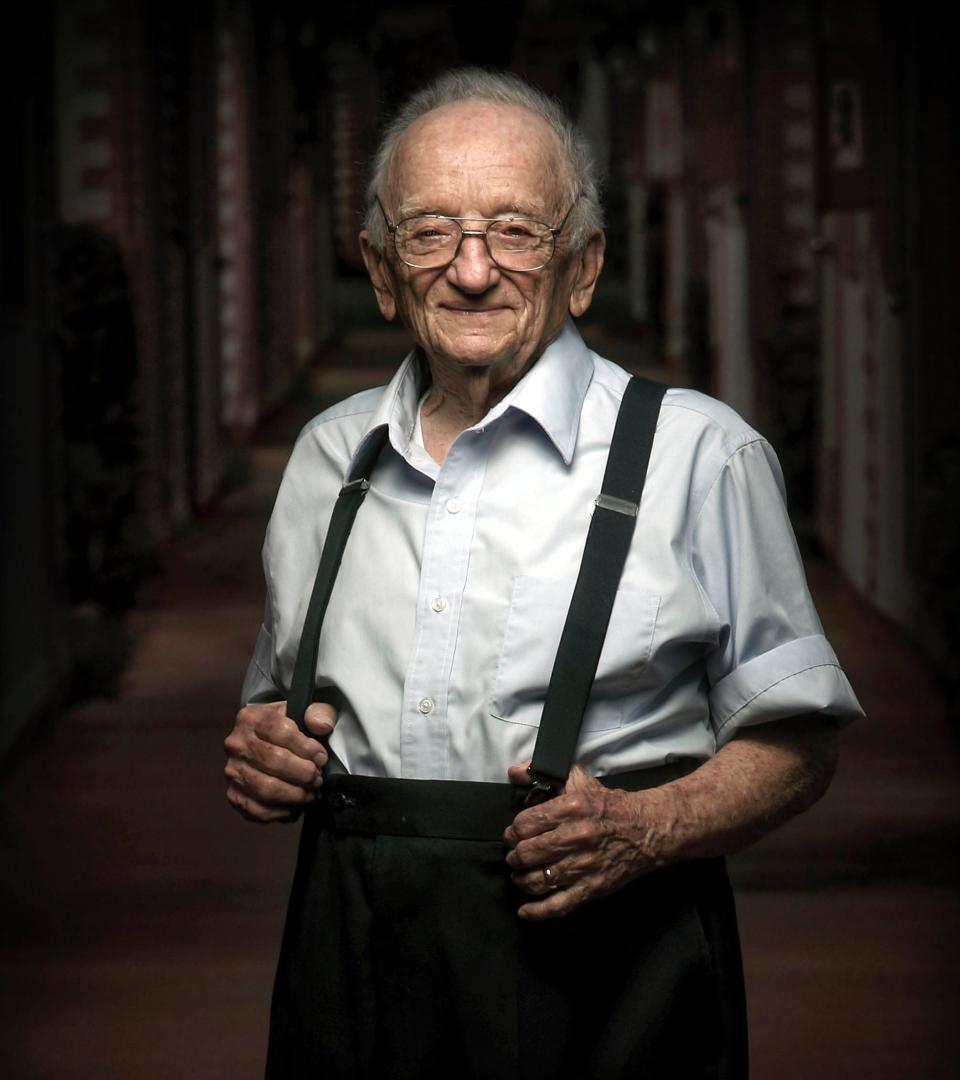Ben Ferencz, last Nuremberg trials prosecutor, dies at 103 in Boynton Beach
- Oops!Something went wrong.Please try again later.
BOYNTON BEACH — Ben Ferencz, the last living prosecutor from the Nuremberg trials, who tried Nazis for genocidal war crimes and was among the first outside witnesses to document the atrocities of Nazi labor and concentration camps, has died. He had just turned 103 in March.
Ferencz died Friday evening in Boynton Beach, according to St. John's University law professor John Barrett, who runs a blog about the Nuremberg trials. The death also was confirmed by the United States Holocaust Memorial Museum in Washington.
“Today the world lost a leader in the quest for justice for victims of genocide and related crimes,” the museum tweeted.
The last surviving Nuremberg Trials prosecutor lives in Delray Beach
Last surviving Nuremberg prosecutor aims to ‘save the world’
More: Nuremberg trials prosecutor, 91, speaks in Boca Raton
Ferencz: 'I'm doing this for you, the next generation'
Born in Romania in 1920, Ferencz immigrated as a young boy with his parents to New York to escape rampant antisemitism. After graduating from Harvard Law School, Ferencz joined the U.S. Army in time to take part in the Normandy invasion during World War II. Using his legal background, he became an investigator of Nazi war crimes against U.S. soldiers as part of a new War Crimes Section of the Judge Advocate’s Office.
In a conversation with The Palm Beach Post in 2016 at his longtime residence at the Kings Point community in suburban Delray Beach, Ferencz said that even as he closed in on a century of life, he was still fighting the forces of hatred, racism and injustice.
“I’m not doing this for me,” he said at the time. “I’m doing this for you, the next generation.”

As a sergeant in Gen. George Patton’s 3rd Army, Ferencz visited a handful of concentration camps shortly after they were liberated.
“The scenes have been well-depicted,” he said. “Dead bodies lying around, you can’t tell if they're dead or alive, their eyes beg for help. Dysentery, lice, rats, stench. Things that are not only indescribable, but unimaginable.”
That image, he said, changes one’s perception of war.
“I refuse to accept that we, as human beings, cannot change,” Ferencz told The Post.
He was 27 in 1947 when he argued, as chief prosecutor in one of the 13 Nuremberg trials, for the convictions of 22 former commanders who themselves were charged with murdering more than 1 million Jews and other enemies of the Third Reich in Eastern Europe.
All 22 war criminals Ben Ferencz prosecuted were convicted
Rather than depending on witnesses, Ferencz mostly relied on official German documents to make his case. All the defendants were convicted, and more than a dozen were sentenced to death by hanging, even though Ferencz hadn't asked for the death penalty.
“At the beginning of April 1948, when the long legal judgment was read, I felt vindicated,” he later wrote. “Our pleas to protect humanity by the rule of law had been upheld.”
With the war crimes trials winding down, Ferencz went to work for a consortium of Jewish charitable groups to help Holocaust survivors regain properties, homes, businesses, art works, Torah scrolls and other Jewish religious items that the Nazis had confiscated from them. He also later assisted in negotiations that would lead to compensation to the Nazi victims.
Ferencz, a father of four, later wrote book after book calling for what would eventually be the International Criminal Court.
“When I began, when Nuremberg began, war was the approved way of obtaining glory and power,” he told The Post in 2016. “And for a thousand years, wars have been glorified in history.”
He listed Vietnam, Rwanda and Syria as avoidable mistakes of a world consumed by violence.
War: 'They kill each other until they get tired of killing each other'
“Look, the current system is, if the two heads of state are unable to agree, they take their young people, send them out to kill other young people they don’t even know, in a country they may never have heard of, who never did them any harm and may never have harmed anyone,” Ferencz said.
“They kill each other until they get tired of killing each other. Then they each declare victory. They rest. And they kill each other again.”
Ferencz’s dreams were realized in 2002 with establishment of the International Criminal Court in The Hague, though its effectiveness has been limited by the failure of countries like the United States to participate.
“I am a realist because I can see the problems,” he told the Post. “But I’m an optimist because I can see the progress.”
Ferencz is survived by a son and three daughters. His wife died in 2019.
This article originally appeared on Palm Beach Post: Last Nuremberg prosecutor, Ben Ferencz, dies at 103 in Boynton Beach

